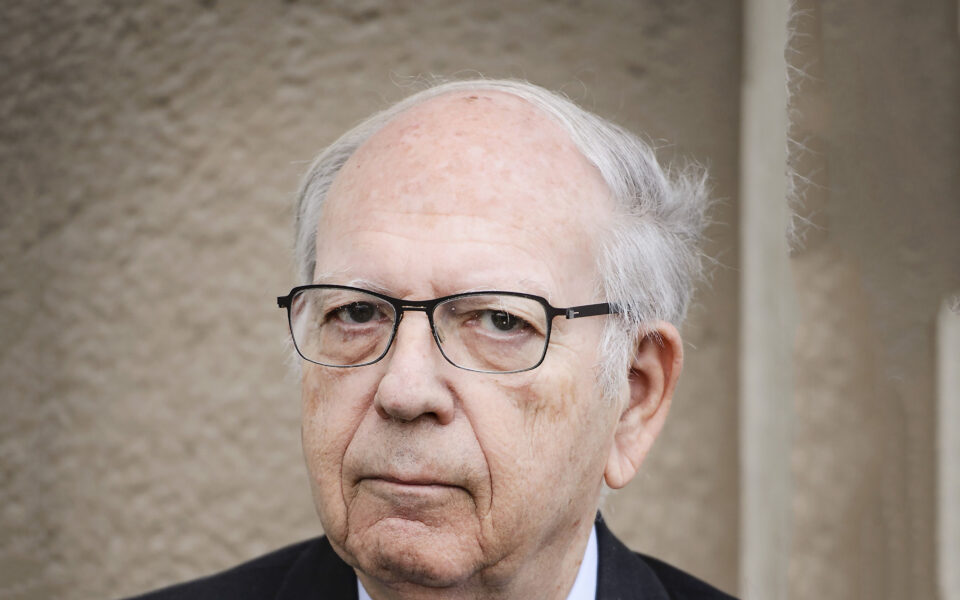How Hamas got into the Israeli mind
Ex-Mossad director on how the terrorist organization managed to short-circuit the country’s intelligence services

“I do not think that Mossad was involved in the case of the serious breach,” notes former Mossad director Efraim Halevy in an interview with Kathimerini. Three weeks after the surprise Hamas attack on Israel, the ninth Mossad director and former head of Israel’s National Security Council was invited to answer the crucial questions that remain unanswered. How did the Hamas terrorist organization manage to short-circuit Israeli intelligence and how did the use of advanced technologies such as artificial intelligence play a role in the failure?
The highly experienced officer nicknamed “the man in the shadows” reveals to Kathimerini that Hamas terrorists probably learned to analyze the Israeli way of thinking and knew how to act on Israeli soil. As he admits, the Palestinians had been preparing the attack for a long time, at a time when there was an internal crisis in Israel. At the end of the conversation, Halevy estimated that the Iranians would not be actively involved in the armed confrontation and that the politically “done” Benjamin Netanyahu might shock the world.
Three weeks after Hamas’ surprise attack, what conclusions can you draw and what went wrong in the intelligence community?
I do not think that Mossad was involved in the case of the serious breach. The coverage of Gaza was not a mission of Mossad, and we were not active there except in very extreme circumstances, which are not really of any consequence, certainly not in recent years. So, I do not know how this came about and how we failed to know what was going on in the last year. Obviously, this attack was planned very much in advance and a lot of preparations had to be made in order to send in over a thousand men. What I will say is that the head of the security service took responsibility in public. The head of military intelligence took responsibility in public. Others have taken responsibility in public. There is only one person who has not taken responsibility in public. And you know who he is.
Every intelligence agency in Israel, such as Shin Bet and Mossad, has informants and agents all over the world. How can a terrorist organization like Hamas mislead Israel about its true intentions?
Look, Israel will try and not only continue to behead the leadership of Hamas, but also maybe to take prisoners in combat once we enter, if we do enter the Gaza Strip, and to interrogate them and find out from them what happened, and in what way were they able to operate the people who are now in Israeli prisons, people who have not been involved in the operation, but I am sure they do know much. What I want to say is that many of the leading figures who participated in the recent attack and are in key positions are people who were in Israeli jails for many years, including Yahya Sinwar, who speaks very good Hebrew. And therefore, they had very good knowledge over the years of assessing the Israeli thought and the way the Israeli mind operates.
From a purely military point of view, this event will probably be studied not only by us but by many other intelligence services around the world because it is of interest beyond the scope of Israel. The capacity of this operation with all the equipment they used – others came by foot and some by motorbikes – need to be studied. It was an organized assault from any point of view. And the fact that they were at one point on the verge of seizing entire control of the divisional command of the forces there, and they had entered the command buildings, is something that is beyond comprehension. All in all, we have so many questions we need to answer, and too few answers for the questions at the moment. What I will say is that the ferocity of the operation is unprecedented. The people who were attacked and murdered were murdered in a very brutal manner. The problem of identifying corpses is reaching the limits of what can be done. And we have hundreds of people who are not accounted for, and, additionally, we have no way of identifying many of the corpses.
From your experience, and given the Arab reaction to what is happening in Gaza, do you fear possible hits on Israeli citizens living abroad?
Look, Hamas was also operating internationally and they carried out operations in various countries. I must say that here, in many cases, it was Mossad that was the branch of the intelligence community that had to handle this, mostly in cooperation with local services. And the successes were very considerable.
Many analysts claim that the intrusion of artificial intelligence into intelligence analysis may cause problems in understanding and identifying risks and threats. Do you share this view?
What I do think when I am talking about artificial intelligence is that artificial intelligence in many cases can be misleading because people do not simply live and operate in a very systematic manner. The human mind, your human mind, and my human mind are very different. I have to say that probably more and more intelligence services – I was also part of this process – you will find that the technological divisions become larger and larger parts of the intelligence services. The technological side has been increasing, but that does not mean that human intelligence is not still very important. You cannot make it without humans.
Lately, Netanyahu has been heavily criticized, while many claim that the Israeli prime minister focused his attention on internal problems and underestimated the external threats, such as Hamas. Do you believe that internal discord led to this disaster?
No, I do nοt think that is the cause of this disaster. Hamas’ preparations seem to have started much earlier, while the eternal discord began after the last general election, which was at the end of last year. After Netanyahu formed his new government with 64 out of 120 seats, he suddenly sprung the judicial reform into the frame and this caused a very fierce reaction in Israel. The demonstrations went on for over 33 weeks and had effects on key elements in the military. For example, in the air force, most of the reserve fighters did not want to continue service and there were other units whose people did not want to be involved in this kind of activity or even leave. All in all, the reform led by the minister of justice on the instructions of Mr Netanyahu weakened Israel in a very serious manner. I mean, at one stage he even more or less dismissed the minister of defense, which aroused an enormous swelling by the opposition against this move and he was actually forced to cancel the act of dismissing him.
One of the things that troubles me is that I would have expected one of two things to happen now. One would be that Mr Netanyahu would publicly declare that he takes responsibility for what happened, or he would announce that he is no longer going to pursue the “mini-revolution” that he was trying to carry out. He has done neither. And there are all kinds of indications that he does not intend to resign after these events when the war is over. He does not want to relent on the judicial reform, but if after this defense and military crisis we had and all the casualties we have had and all the dead and all the missing and all the pain, if he will revert again to this plan of his judicial reform, it will probably affect the relationship between Israel and the United States very much, because President Biden for a long time did not want to see Netanyahu.
As the situation evolves, what is your biggest fear that Israel might face, or challenge? For example, the possible involvement of Hezbollah or Iran in the war?
As far as Hezbollah is concerned, there has been an increase in the events in the north. We have evacuated a large area near the border, and we have already increased this from 2 kilometers depth to 10 and probably we are going to evacuate Kiryat Shmona, which is a big town. And I think all in all, there is going to be quite a movement of population from the north unless Hezbollah tunes down.
I do not think that Hezbollah wants to enter an all-out confrontation with Israel. We are prepared for that. We are prepared for a war on two fronts. Of course, we are not enamored with this, but it is certainly something that is on the agenda. On the other hand, I do not think that Iran will enter this in any way, because Iran’s interests now are to develop its new relations with Saudi Arabia, which were carried out by China, who brought the two together. Therefore, I do not think that China wants the war to start engulfing the Middle East, certainly not Saudi Arabia, which in the meantime has suspended its talks on normalization. So, I do not think that Hezbollah would necessarily go to an all-out confrontation without having the backing of Tehran and the entry of Iran. And I do not think the Iranians are interested in this at the moment.
Do you expect the intelligence failure will lead to a revision of the intelligence doctrine?
No, I cannot say that. We will have first to check where the failures were, and we will have to make the necessary corrections to take care of the failures. It is going to be a painful process. Possibly the head of the security service will leave at one time. The director of military intelligence will probably leave at that time, and even the chief of staff will ultimately have to assume responsibility. As for the next day on the Israeli political scene, a possible return to this judicial reform would be a step, which would be beyond description. But Mr Netanyahu is famous for doing the impossible and shocking people in one way or another.





